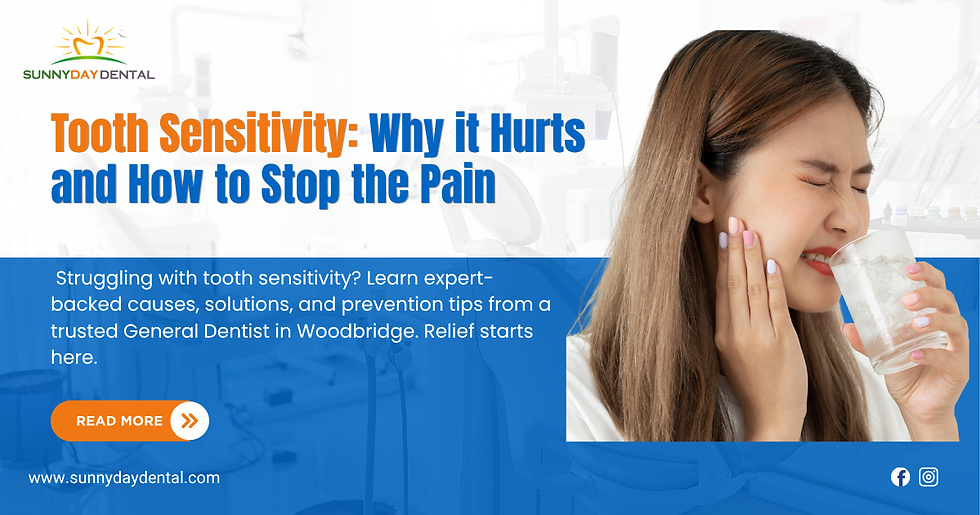What Are Dentures? [3 Key Types & Must-Know Benefits]
- Sunny Day Dental
- Apr 8
- 4 min read

Losing teeth can impact more than just your smile—it can affect your confidence, speech, and ability to eat comfortably. That’s where dentures come in. Thanks to modern advancements, today’s dentures are far more comfortable, natural-looking, and functional than they used to be. Whether you're missing a few teeth or need a full replacement, this blog—brought to you by a trusted dental office in Brampton—will help you understand what dentures are, the different types of dentures, and why they might be the perfect solution for you.
What Are Dentures?
Dentures are custom-made dental appliances designed to replace missing teeth and restore oral function. They can be full (replacing all teeth) or partial (replacing a few missing teeth) and are either removable or implant-supported.
Advancements in 2025 have led to dentures made from high-quality acrylic resins, flexible polymers, and even 3D-printed materials—enhancing their comfort, fit, and durability. They help maintain the structure of your mouth and prevent facial muscles from sagging due to tooth loss.
What are the 3 main types of dentures?
The three key types of dentures are:
Complete Dentures – Replace all missing teeth.
Partial Dentures – Replace one or more missing teeth.
Implant-Supported Dentures – Snap onto dental implants for added stability.
3 Key Types of Dentures You Should Know
1. Complete Dentures
These are used when all teeth in either the upper or lower jaw are missing. Made from acrylic, they rest directly on the gums. Complete dentures are usually removable and are custom-fitted to ensure comfort and a natural look.
✅ Ideal for patients with total tooth loss.
✅ Available as conventional or immediate dentures.
2. Partial Dentures
If you still have some healthy natural teeth, partial dentures may be the ideal solution. These dentures include a metal or acrylic base with prosthetic teeth, and they attach to your existing teeth via clasps or precision attachments.
✅ Maintains tooth alignment.
✅ Prevents surrounding teeth from shifting.
3. Implant-Supported Dentures
These are the most advanced type. Dental implants are surgically placed into the jawbone, and the dentures snap onto them securely. They offer superior stability, function like natural teeth, and are great for long-term oral health. If you're considering this option, a reputable dental office in Brampton can guide you through the process and ensure the best possible outcome.
✅ No slipping or movement.
✅ Better chewing efficiency and jawbone stimulation.
Must-Know Benefits of Dentures
1. Improved Appearance & Confidence
Dentures fill out the appearance of your face and restore your smile, helping you feel more confident in social and professional settings.
2. Enhanced Chewing & Speech
With missing teeth, eating and speaking can be challenging. Dentures improve speech clarity and let you enjoy a wider range of foods.
3. Affordable & Non-Invasive Solution
Compared to implants or bridges, dentures are often a more affordable option and require no invasive surgery—making them a great choice for many patients.
4. Custom Fit for Comfort
Modern technology ensures a snug fit that minimizes discomfort or irritation, especially when you choose an expert dental clinic in Vaughan like Sunny Day Dental.
5. Maintains Oral Structure
They help support the facial muscles and preserve the alignment of remaining teeth (in the case of partial dentures).
Dentures in Woodbridge—Why Local Expertise Matters
Choosing a clinic experienced in dentures in Woodbridge means access to advanced technology, personalized consultations, and long-term support. At Sunny Day Dental, we take the time to understand your unique dental needs and create solutions that bring back your smile—with confidence and care.
Ready to Reclaim Your Smile?
At Sunny Day Dental, your journey to a confident smile begins with expert care and personalized attention. Whether you need full, partial, or implant-supported dentures in Woodbridge, our team ensures you receive the most comfortable and natural-looking solution possible. With our state-of-the-art tools and compassionate approach, you’ll be smiling, chewing, and speaking with confidence in no time.
FAQs
Q1. How long do dentures last?
With proper care, dentures can last 5–10 years. However, due to changes in your jawbone and gums, they may need to be relined or replaced for a better fit.
Q2. Are dentures difficult to get used to?
It can take a few weeks to adjust. During this time, you may experience minor discomfort or difficulty speaking, but with practice, most people adapt smoothly.
Q3. Can I sleep with my dentures on?
While technically possible, it’s recommended to remove dentures at night to give your gums a rest and to prevent infection or bone resorption.
Q4. Do I still need to see the dentist regularly if I have dentures?
Absolutely! Routine check-ups ensure your dentures fit well and your oral tissues remain healthy. Your dentist can also look for signs of gum disease or oral cancer.
Q5. What are some signs that my dentures need adjustment?
If you notice sore spots, slipping, difficulty chewing, or pressure on certain areas, it might be time for a professional adjustment.




Comments